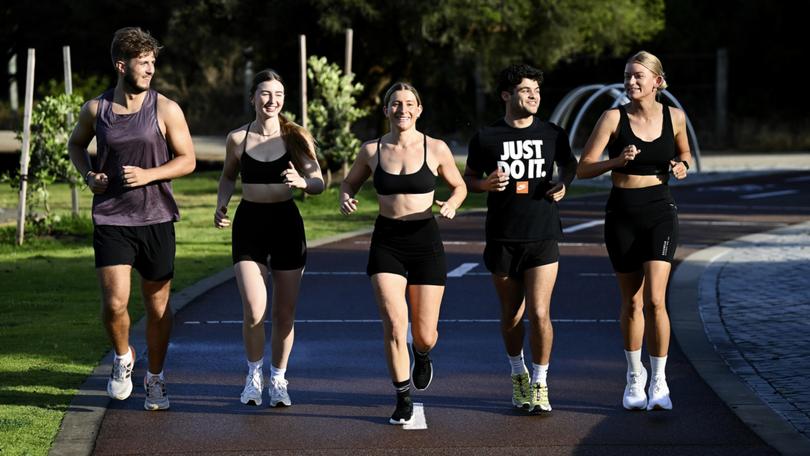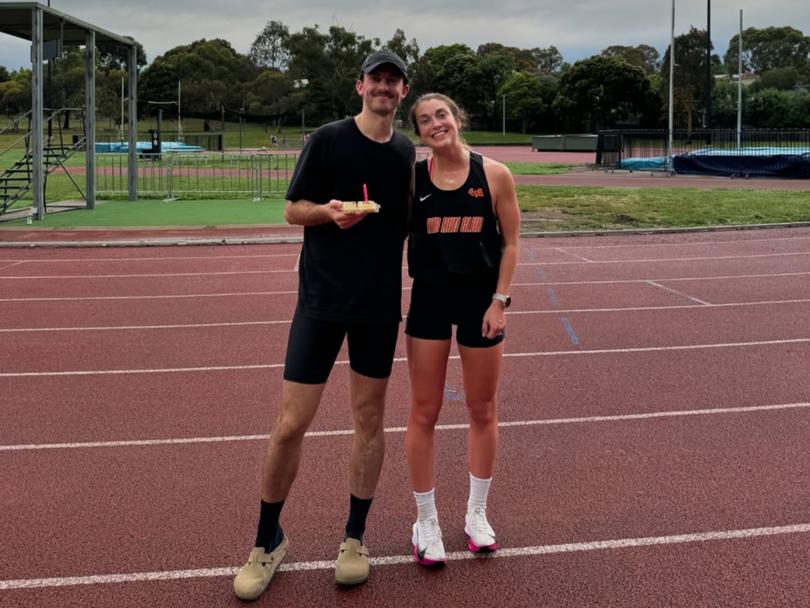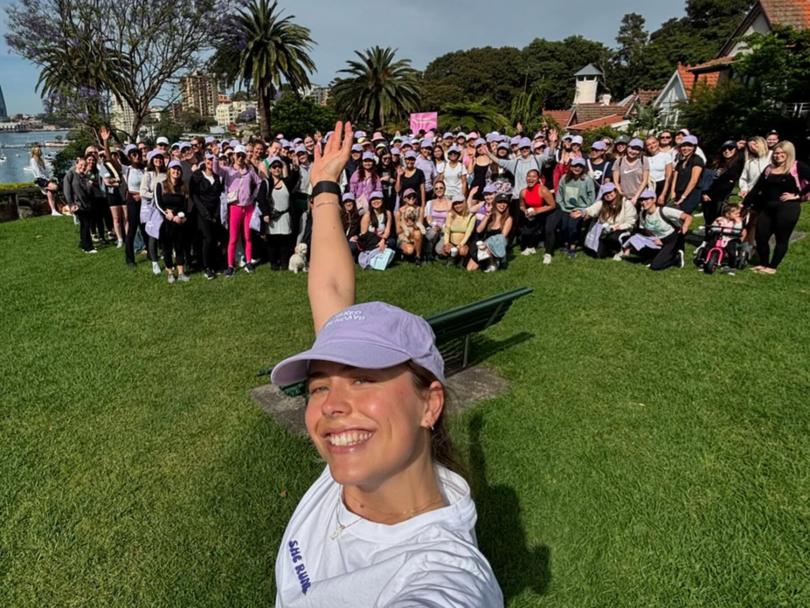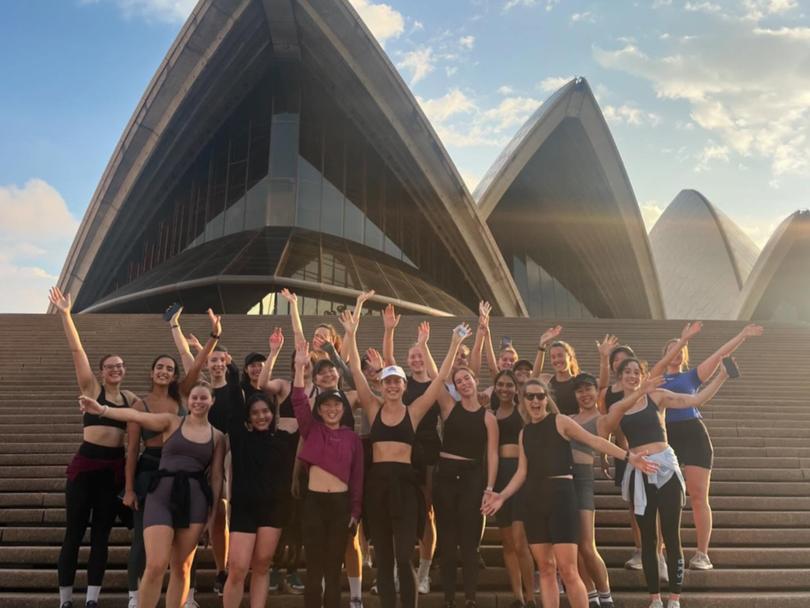Run clubs: The new high young people are chasing is no less sweaty than a nightclub, but way more ‘wholesome’
Young people are chasing a whole new kind of high these days — one that is no less sweaty, but is infinitely more “wholesome” than those older generations sought on weekends.

Young people are chasing a whole new kind of high these days — one that is no less sweaty, but is infinitely more “wholesome” than the how older generations used to spend their weekends.
Greeting the weekend sun has taken on a whole new meaning in 2024. Gone are the days of watching it through bleary, still-tipsy eyes on the slow trudge home from a nightclub. Today, Gen Z’s and Millennials watch the sunrise while pounding kilometres of pavement alongside dozens of fellow bright-eyed and bushy-tailed clubbers.
This is the era of the run club.
Sign up to The Nightly's newsletters.
Get the first look at the digital newspaper, curated daily stories and breaking headlines delivered to your inbox.
By continuing you agree to our Terms and Privacy Policy.Their savings are going on lycra and high-tech runners over dresses and heels. Espresso martinis and craft beers are swapped for green smoothies and strawberry matcha. Kebabs and chips doused in chicken salt are out. Giant acai bowls packed with peanut butter and berries are in.
Some clubbers track their split times to beat a personal best. Others keep a steady pace and even steadier conversation. Some new runners slow to a walk and laugh, hands on hips, as they puff their way up a hill. Meanwhile, the odd pair peels off for breathless flirting, matching their steps as they think to swap social media details at the finish line.
Run clubs have exploded across Australia in the last 12 months, emerging as the go-to all-in-one social club for fun, fitness, friendship and even romance in the post-COVID world.
The rise is the product of overlapping trends: a hunger for real-world connections after years of isolation and video conference-everything, a turn away from alcohol, particularly among young people, and the popularity of health and fitness content on social media.
Research from Drinkwise shows 76 per cent of young Australians like to socialise in ways that don’t involve drinking. Two-thirds of them also say they don’t want to ruin the following day with a hangover.
It’s part of why why Mollie Burke and her brother, Jack, founded RTB Run Club in Melbourne’s eastern suburbs in mid-2023.
“The way we used to catch up was through running together and getting a coffee, and we found it was nice to catch up in an environment that didn’t involve alcohol,” Ms Burke, 30, said.

“When was the last time you caught up with your mates that didn’t involve alcohol? We realised that it’s been a long time. So we wanted to start something that was more wholesome.”
In the last 18 months, RTB Run Club — short for Run The Burbs — has grown from five runners to a 6000-strong social media following where upwards of 150 people descend on Croydon and Box Hill at dawn multiple times a week.
“We know how hard it can be to make friends when you’re an adult — when you’re out of school, or team sports and out of routine,” Ms Burke said.
“But that’s what our runners say they enjoy about run club, they have routine again. Some have told me they used to go out on a Friday night because they didn’t have anything on Saturdays. Now they have this.
“They prefer waking up feeling good, they’re not getting hangovers and anxiety about what they’d done the night before. Instead they’ve got a real sense of belonging and being part of a community.”
The deviation from drinking culture — once a quintessential part of growing up in Australia — for a healthier mindset stems from a number of reasons, says head of The Kids Research Institute Australia’s brain and behaviour research Ben Jackson.
Professor Jackson said cost of living crunch has made a night out a luxury to many, and one that, when coming up against advertising about the detrimental effects of alcohol, isn’t appealing anymore. That’s before wellness influencers come into play.
However, Professor Jackson says, it’s the physical benefits that are the most compelling reason for this health kick among younger Aussies.
“There is improved mood and self-esteem, protective effects against stress and anxiety,” he says. “People sleep better and it (exercise) assists with recovery out of mental illness and psychological distress.
“All of those things are really crucial, and often if you think of how quickly you can get the benefits, it’s those things that arise much quicker than fitness or weight loss.
“But the mood, social elements, self-esteem and wellbeing can come almost immediately. It puts a smile on most people’s faces and it gives us a chance to learn and push ourselves, and test ourselves as well.”
Also adding to the allure is the gamification of fitness through apps like Strava and fitness gadgets — like Fitbits and Aura rings — to measure health data.
Strava, the world’s biggest fitness tracking app, says “run clubs are replacing nightclubs as social hot spots”, with its Year In Sport: Trend Report finding a 59 per cent rise in run club participation in 2024.
The report — which analysed data from more than 135 million members across 190 countries and surveyed a further 5000 active people — found “making social connections” was the leading motivator for exercise, with 58 per cent of respondents saying they found friends through fitness groups.
It’s exactly how 23-year-old graduate Millie Rowley says she met most of her friends in Sydney after completing her degree over Zoom classes during the pandemic.

Feeling “disenfranchised” she decided to join the city’s Unofficial Run Club — one of the biggest of its kind in Australia, with more than 53,300 Instagram followers — for a 5.45am run across the Sydney Harbour Bridge in 2023. She says she was immediately “blown away” by the experience.
“I was like, this is something really special,” she said. “You almost can’t put words to it. It’s just such a feeling, as cheesy as that sounds.”
Inspired, she founded She Runs, an all-women running club that makes tracks across Sydney on Wednesday and Sunday mornings.
“I thought it was really clever that running clubs were being branded the new dating apps, but I found my favourite parts was meeting girls who became my friends,” Ms Rowley said. “I figured other women would want spaces just for us to get together, too.”
Almost a year later, She Runs has a loyal following of 23,600 on Instagram and hosts hundreds of women at weekly running, walking and Pilates meets.

“There’s an experience that happens when women are together where there’s a sense of safety and connection, and it’s a really beautiful thing when you feel protected and included. And it’s a special thing in any space,” Ms Rowley said.
She said most of her community are expats who have moved to Sydney — and for those women, in particular, “community is essential”.
“There’s clearly been a shift after COVID with people focusing on health that’s encouraged this beautiful wave of people who want to find like-minded friends to do something social that isn’t alcohol.
“It’s challenging, but I think people have also realised that there’s something extra special when a friendship doesn’t need alcohol to work, it feels deeper.”
